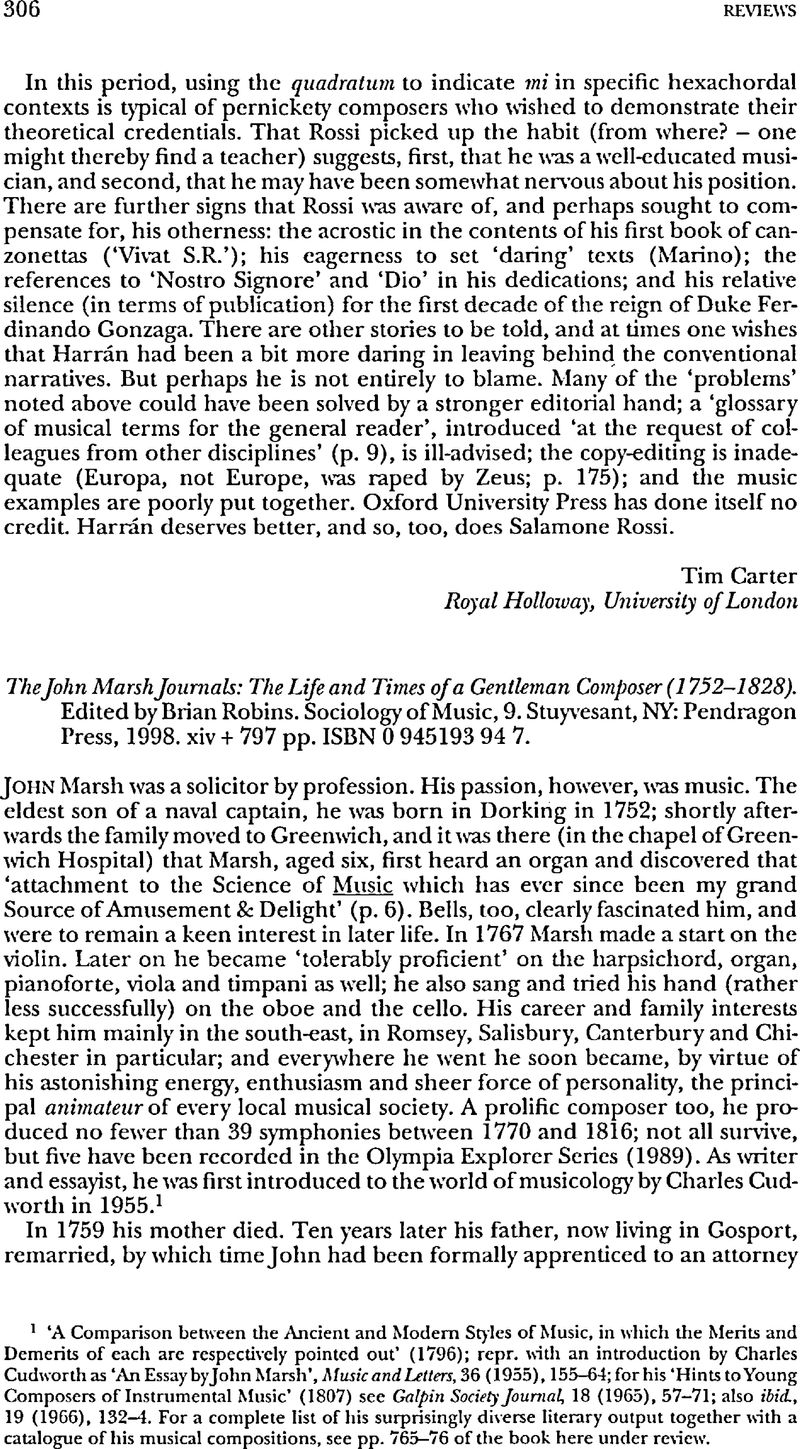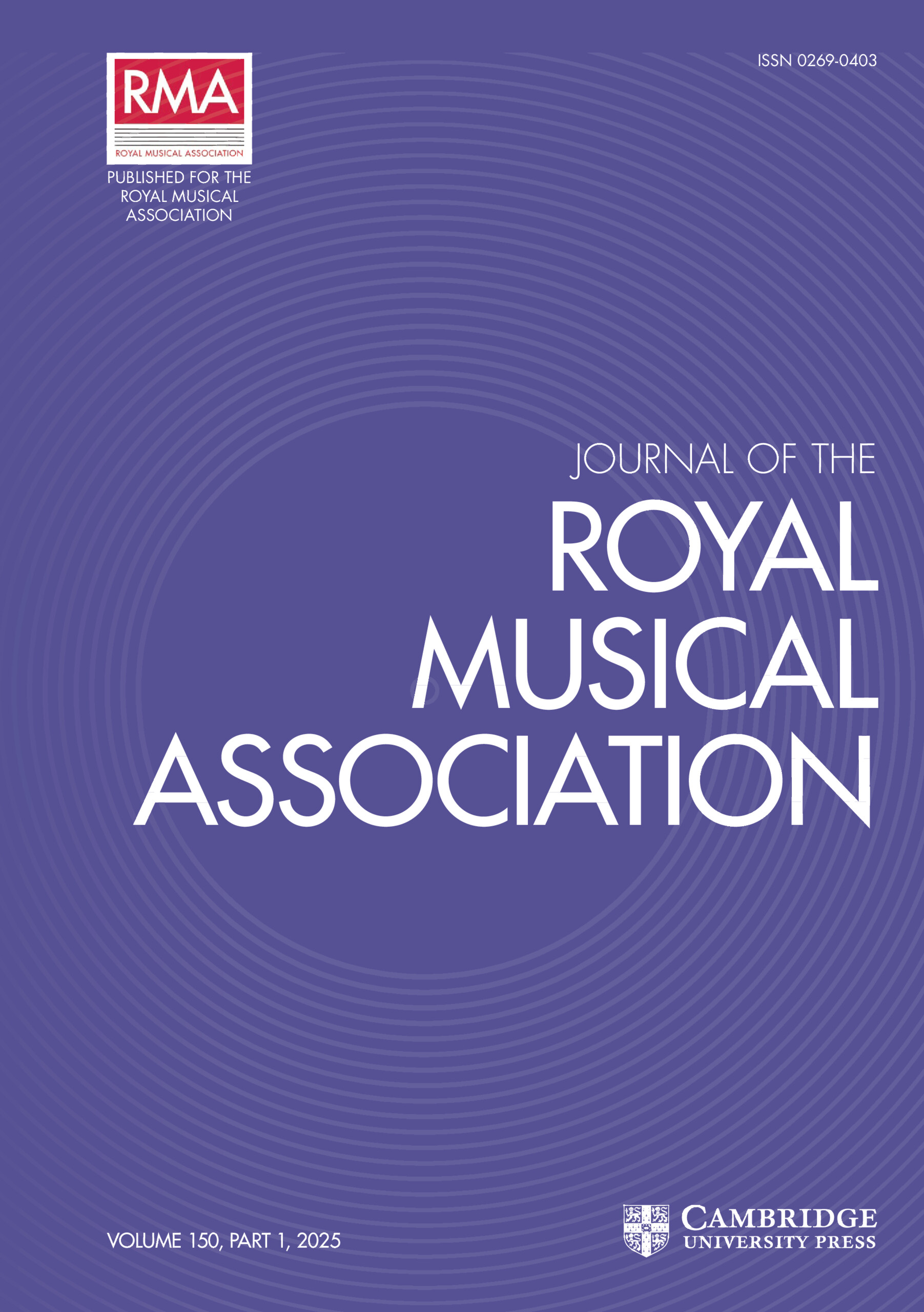No CrossRef data available.
Article contents
The John Marsh Journals: The Life and Times of a Gentleman Composer (1752–1828). Edited by Brian Robins. Sociology of Music, 9. Stuyvesant, NY: Pendragon Press, 1998. xiv + 797 pp. ISBN 0 945193 94 7.
Review products
Published online by Cambridge University Press: 01 January 2020
Abstract

- Type
- Reviews
- Information
- Copyright
- Copyright © Royal Musical Association, 2000
References
1 'A Comparison between the Ancient and Modern Styles of Music, in which the Merits and Demerits of each are respectively pointed out’ (1796); repr. with an introduction by Charles Cudworth as ‘An Essay by John Marsh’, Music and Letters, 36 (1955), 155–64; for his ‘Hints to Young Composers of Instrumental Music’ (1807) see Galpin Society Journal, 18 (1965), 57–71; also ibid., 19 (1966), 132–4. For a complete list of his surprisingly diverse literary output together with a catalogue of his musical compositions, see pp. 765–76 of the book here under review.Google Scholar
2 For a detailed account of Marsh's activities as a concert manager in both Canterbury and Chichester, and also such details of the programmes as survive, see Robins, Brian, ‘John Marsh and Provincial Music Making in Eighteenth-Century England’, RMA Research Chronicle, 29 (1996), 96–142.CrossRefGoogle Scholar
3 For a rather fuller and (I think) more interesting account of the source than is contained in the Introduction to the present volume, see Robins, Brian, ‘An Introduction to the Journals of John Marsh’, Huntington Library Quarterly, 59 (1997–8), 125–44.Google Scholar
4 See Sadie, Stanley, ‘British Chamber Music, 1720–1790’ (Ph.D. dissertation, University of Cambridge, 1958–9), and ‘Concert Life in Eighteenth Century England’, Proceedings of the Royal Musical Association, 85 (1958–9), 17–30.CrossRefGoogle Scholar
5 See H. Diack Johnstone, ‘A Ringside Seat at the Handel Commemoration’, Musical Times, 125 (1984), 632–6.Google Scholar
6 See, for example, Weber, William, ‘The Fabric of Daily Life and the Autobiography of John Marsh’, Huntington Library Quarterly, 59 (1997–8), 145–69; John Brewer, The Pleasures of the Imagination: English Culture in the Eighteenth Century (London, 1997), Chapter 14; and idem, ‘John Marsh's History of my Private Life 1752–1828’, History and Biography: Essays in Honour of Derek Beales, ed. T. C. W. Blanning and David Cannadine (Cambridge, 1996), 72–87.Google Scholar
7 For the programme, see H. C. Robbins Landon, Haydn in England 1791–1795 (London, 1976), 81.Google Scholar
8 Marsh was present for the first London performance of the Mozart Requiem on 21 February 1801, however.Google Scholar
9 See Landon, Haydn in England, 173–4.Google Scholar
10 Weber, , ‘The Fabric of Daily Life’, 146.Google Scholar
11 For further information on the Microcosm, see Arthur W. J. G. Ord-Hume, Barrel Organ (London, 1978), 211–14, and Michael I. Wilson, Musical Instruments: A List of Books and Articles in the National Art Library (London, 1976), 37. There are also three anonymous poems in praise of the clock and its music in John Farmer's History of the Ancient Town, and once Famous Abbey of Waltham (London, 1735). I am indebted to Anthony Hicks for the first and last of these references.Google Scholar
12 For much the most up-to-date information on Paxton, see Crosby, Brian, ‘Stephen and Other Paxtons: An Investigation into the Identities and Careers of a Family of Eighteenth-Century Musicians’, Music and Letters, 81 (2000), 41–64.Google Scholar
13 See Laurie, Margaret, ‘Did Purcell Set “The Tempest”?’, Proceedings of the Royal Musical Association, 90 (1963–4), 43–57.Google Scholar
14 The differences will be immediately apparent to anyone who cares to compare the extracts quoted above with the versions printed in the book under review; in mine, the incidentals of the autograph are all carefully reproduced.Google Scholar


